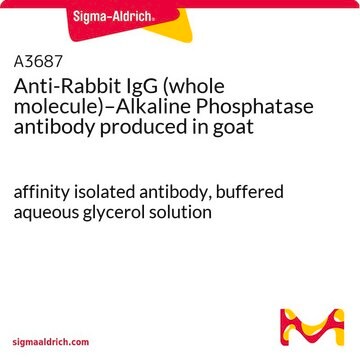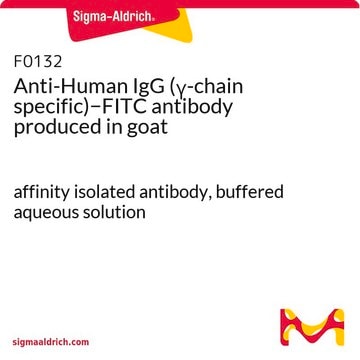I9885
Anti-Human IgG (γ-chain specific), F(ab′)2 fragment antibody produced in goat
affinity isolated antibody, lyophilized powder
Sinónimos:
Goat Anti-Human IgG
About This Item
Productos recomendados
biological source
goat
Quality Level
conjugate
unconjugated
antibody form
affinity isolated antibody
antibody product type
secondary antibodies
clone
polyclonal
form
lyophilized powder
packaging
pkg of 5x1 mg
pkg of 1 mg
storage condition
avoid repeated freeze/thaw cycles
technique(s)
Ouchterlony double diffusion: suitable
quantitative precipitin assay: suitable
color
white to off-white
solubility
water: soluble, clear to hazy, colorless (after reconstitution with 1 ml of 0.135 M NaCl)
storage temp.
2-8°C
target post-translational modification
unmodified
Categorías relacionadas
General description
Immunogen
application
Physical form
Disclaimer
Not finding the right product?
Try our Herramienta de selección de productos.
Storage Class
11 - Combustible Solids
wgk_germany
WGK 3
flash_point_f
Not applicable
flash_point_c
Not applicable
ppe
Eyeshields, Gloves, type N95 (US)
Certificados de análisis (COA)
Busque Certificados de análisis (COA) introduciendo el número de lote del producto. Los números de lote se encuentran en la etiqueta del producto después de las palabras «Lot» o «Batch»
¿Ya tiene este producto?
Encuentre la documentación para los productos que ha comprado recientemente en la Biblioteca de documentos.
Nuestro equipo de científicos tiene experiencia en todas las áreas de investigación: Ciencias de la vida, Ciencia de los materiales, Síntesis química, Cromatografía, Analítica y muchas otras.
Póngase en contacto con el Servicio técnico








